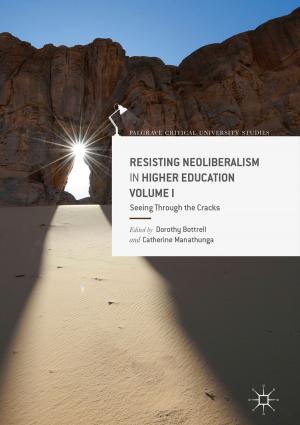Dewey, Heidegger, and the Future of Education
Beyondness and Becoming
Nonfiction, Religion & Spirituality, Philosophy, Pragmatism, Reference & Language, Education & Teaching, Educational Theory, Philosophy & Social Aspects| Author: | Vasco d'Agnese | ISBN: | 9783030194826 |
| Publisher: | Springer International Publishing | Publication: | May 21, 2019 |
| Imprint: | Palgrave Macmillan | Language: | English |
| Author: | Vasco d'Agnese |
| ISBN: | 9783030194826 |
| Publisher: | Springer International Publishing |
| Publication: | May 21, 2019 |
| Imprint: | Palgrave Macmillan |
| Language: | English |
Drawing on insights into the philosophies of Dewey and Heidegger, this book moves forward the greater philosophical discourse surrounding education. It illuminates deep affinities between the corresponding traditions of Dewey and Heidegger, broadly labeled hermeneutics and pragmatism, and in doing so reveals the potential of the Dewey-Heidegger comparison for the future of education. To accomplish this task, Vasco d’Agnese explores the Deweyan and Heideggerian understanding of existence and experience. Both thinkers believed that humans are vulnerable from the very beginning, delivered to an uncanny and uncertain condition. On the other hand, such an uncanniness and dependency, rather than flowing in nihilistic defeat of educational purposes, puts radical responsibility on the side of the subject. It is, then, educationally promising. The book explains that for both Dewey and Heidegger, being a subject means being-with-others while transcending and advancing one’s boundaries, thus challenging the managerial framework of education that currently dominates educational institutions throughout the world.
Drawing on insights into the philosophies of Dewey and Heidegger, this book moves forward the greater philosophical discourse surrounding education. It illuminates deep affinities between the corresponding traditions of Dewey and Heidegger, broadly labeled hermeneutics and pragmatism, and in doing so reveals the potential of the Dewey-Heidegger comparison for the future of education. To accomplish this task, Vasco d’Agnese explores the Deweyan and Heideggerian understanding of existence and experience. Both thinkers believed that humans are vulnerable from the very beginning, delivered to an uncanny and uncertain condition. On the other hand, such an uncanniness and dependency, rather than flowing in nihilistic defeat of educational purposes, puts radical responsibility on the side of the subject. It is, then, educationally promising. The book explains that for both Dewey and Heidegger, being a subject means being-with-others while transcending and advancing one’s boundaries, thus challenging the managerial framework of education that currently dominates educational institutions throughout the world.















